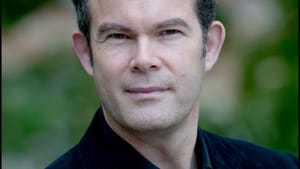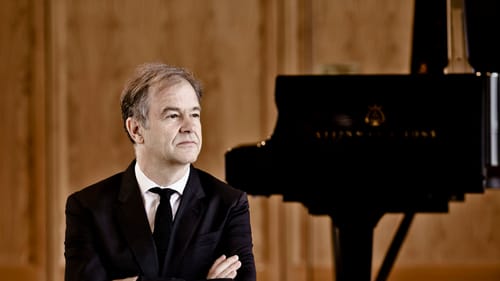Stay in the Loop
BSR publishes on a weekly schedule, with an email newsletter every Wednesday and Thursday morning. There’s no paywall, and subscribing is always free.
Kings of song
PCMS presents Gerald Finley, bass-baritone, and Julius Drake, piano

Canadian bass-baritone Gerald Finley returned to Philadelphia Chamber Music Society (PCMS) after a four-year absence on April 20, the first engagement of a three-week North American tour. Aided by his regular accompanist Julius Drake, he gave an absolute master class in the art of the recital, commanding the Perelman Theater stage for two hours with a program of German lieder, Russian ballads, and English-language folk songs.
The qualities that serve Finley well as an opera singer — his distinctive, richly rounded vocal tone; intelligent textual delivery; and flawless language skills — translate ideally to song literature. At 58, his always medium-sized instrument shows virtually no diminution. He moves seamlessly between registers, with pleasing amounts of lightness and heft at the extremes of his range.
The recital program certainly tested those extremes. Few non-native singers would devote a full half of their program to Russian songs, and fewer still would evoke the name of one of their greatest modern exponents while doing so. But Finley started his Slavic set with a remembrance of Siberian baritone Dmitri Hvorostovsky, who died in November 2017 after a long struggle with brain cancer.
Finley expressed his “great respect” for Russia’s cultural heritage but commented that it wasn’t until hearing Hvorostovsky perform Tchaikovsky and Rachmaninoff on a recital disc that he fully understood the music’s power. He certainly showed himself to be a more than fine student in two wide-ranging groups by those composers, beginning with a playful rendition of “Don Juan’s Serenade” from Tchaikovsky’s Six Romances (Op. 38).
The Tchaikovsky set also showed Finley’s penchant for delicacy, especially in the familiar “None but the Lonely Heart,” which unspooled with flawless legato. His expressivity was ever apparent, too; despite my utter lack of Russian skills, I never had to consult the printed texts to understand what Finley was singing. Dima, as he was affectionately known, would have been proud.
Excellent accompanist
Rachmaninoff’s narrative songs allowed ample opportunity for vocal acting. Finley especially seemed at home in “Fate,” which imagines destiny as a mercurial crone whose walking stick can ever be heard tapping the ground behind us. His onomatopoetic cries of stuk, stuk, stuk (“knock, knock, knock"), which punctuate the verse, alternated between humor and danger. By the end of the aria, when Fate showed her true power, I felt appropriately unsettled.
Unsurprisingly, Rachmaninoff’s songs allowed many opportunities for Drake to distinguish himself. He vigorously supported Finley throughout the long and evolving “Fate,” but also had fun with the composition’s tongue-in-cheek references to Beethoven’s Symphony No. 5 in C Minor. He provided an appropriately speculative atmosphere for the moving “Christ is Risen” and dexterously dispatched the “Spring Waters.” It’s clear why Drake is one of the most sought-after accompanists on the international scene.

Finley devoted the recital’s first half to settings of Goethe by Schubert and Beethoven. These included a near-definitive performance of “Erlkönig” (“The Elf King”). Here, he delineated the lied’s complicated narrative, giving voice to the distressed father and his dying son, lost under the spell of a fairy monarch.
“Prometheus,” Schubert’s great cry to the gods, sounded at once stentorian and vulnerable. You could believe this was a forsaken man. Finley brought appropriate swagger to “An Schwager Kronos” (“To Coachman Kronos”) and melancholy restraint to “Shepherd’s Lament.” Only “An den Mond” (“To the Moon”) dipped into mawkishness.
Rocky start, strong finish
The Beethoven set was rougher, with Finley tending toward flatness in the earlier songs. Maybe he just needed time to warm up. By the cycle’s last lied, “Aus Goethes Faust” (“From Goethe’s Faust”), he seemed at ease with the material and vocally open.
The evening closed with a selection of folk songs that showed Finley at home in the English idiom. Particularly beautiful was Respighi’s setting of Robert Burns’s “My Heart’s in the Highlands,” which shows the Italian composer’s keen musicological ear. And although I’d just as soon never hear Aaron Copland’s “Ching-a-Ring Chaw” again, Finley had no trouble with song’s driving rhythms.
Let’s hope Finley and Drake don’t make us wait four years for another visit. In the meantime, readers residing near any of the duo’s upcoming tour stops — New York, Atlanta, Washington, and Toronto — should snap up tickets.
What, When, Where
Gerald Finley, bass-baritone. Julius Drake, piano. Selections by Beethoven, Schubert, Tchaikovsky, Rachmaninoff, Copland, Barber, Respighi, and Britten. Philadelphia Chamber Music Society. April 20, 2018, at the Kimmel Center’s Perelman Theater, 300 S. Broad Street, Philadelphia. (215) 569-8080 or pcmsconcerts.org.
Sign up for our newsletter
All of the week's new articles, all in one place. Sign up for the free weekly BSR newsletters, and don't miss a conversation.
 Cameron Kelsall
Cameron Kelsall